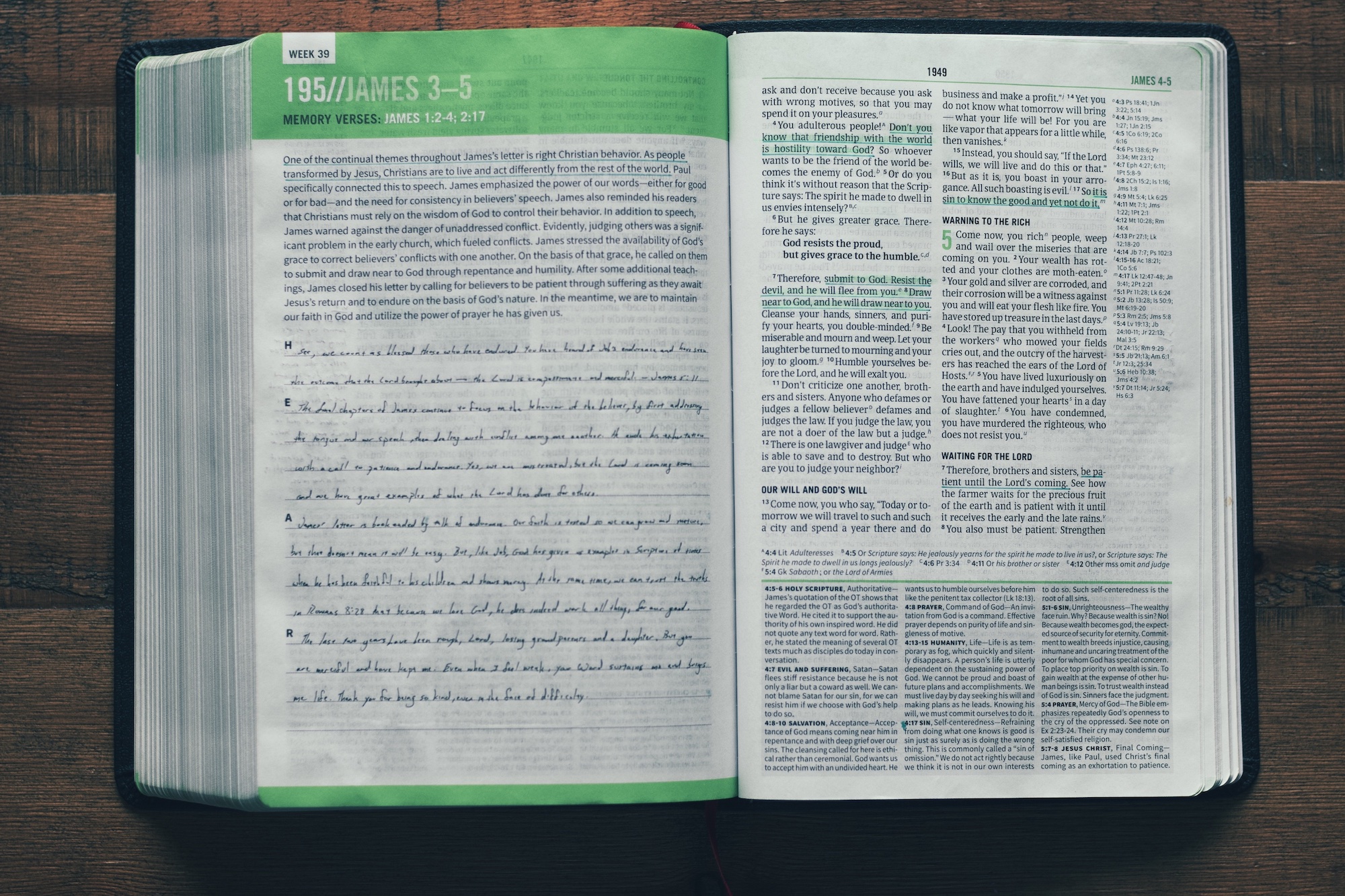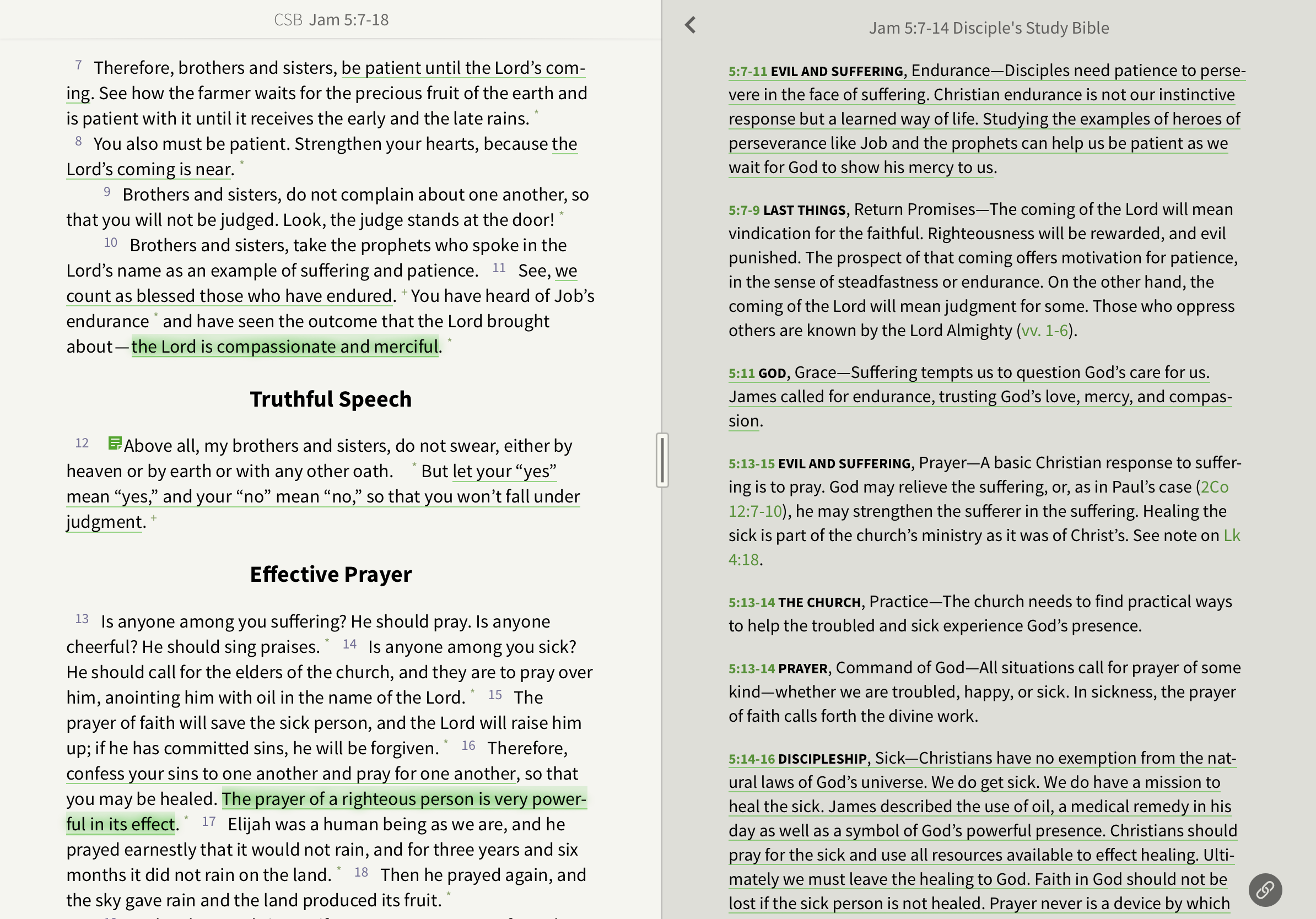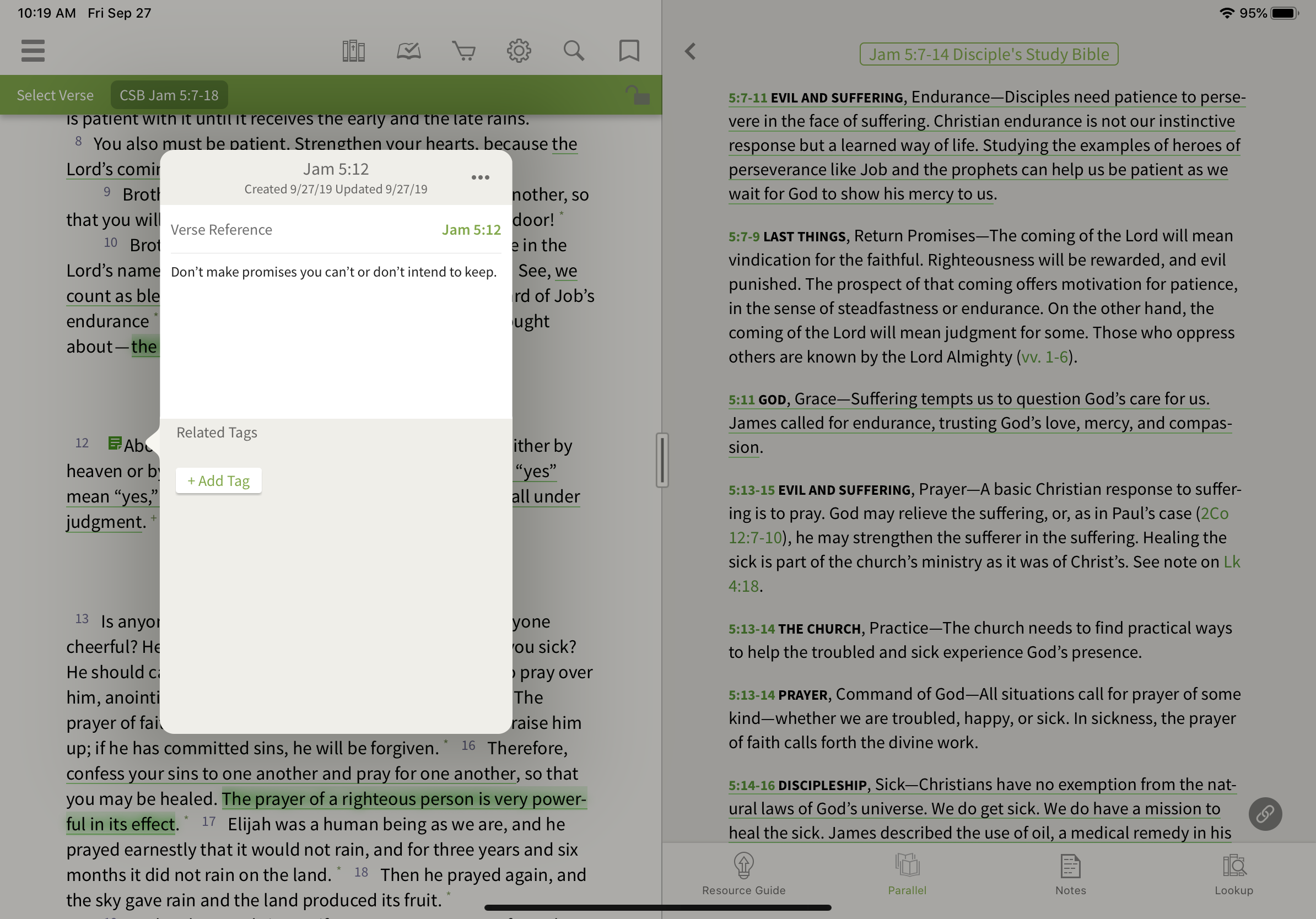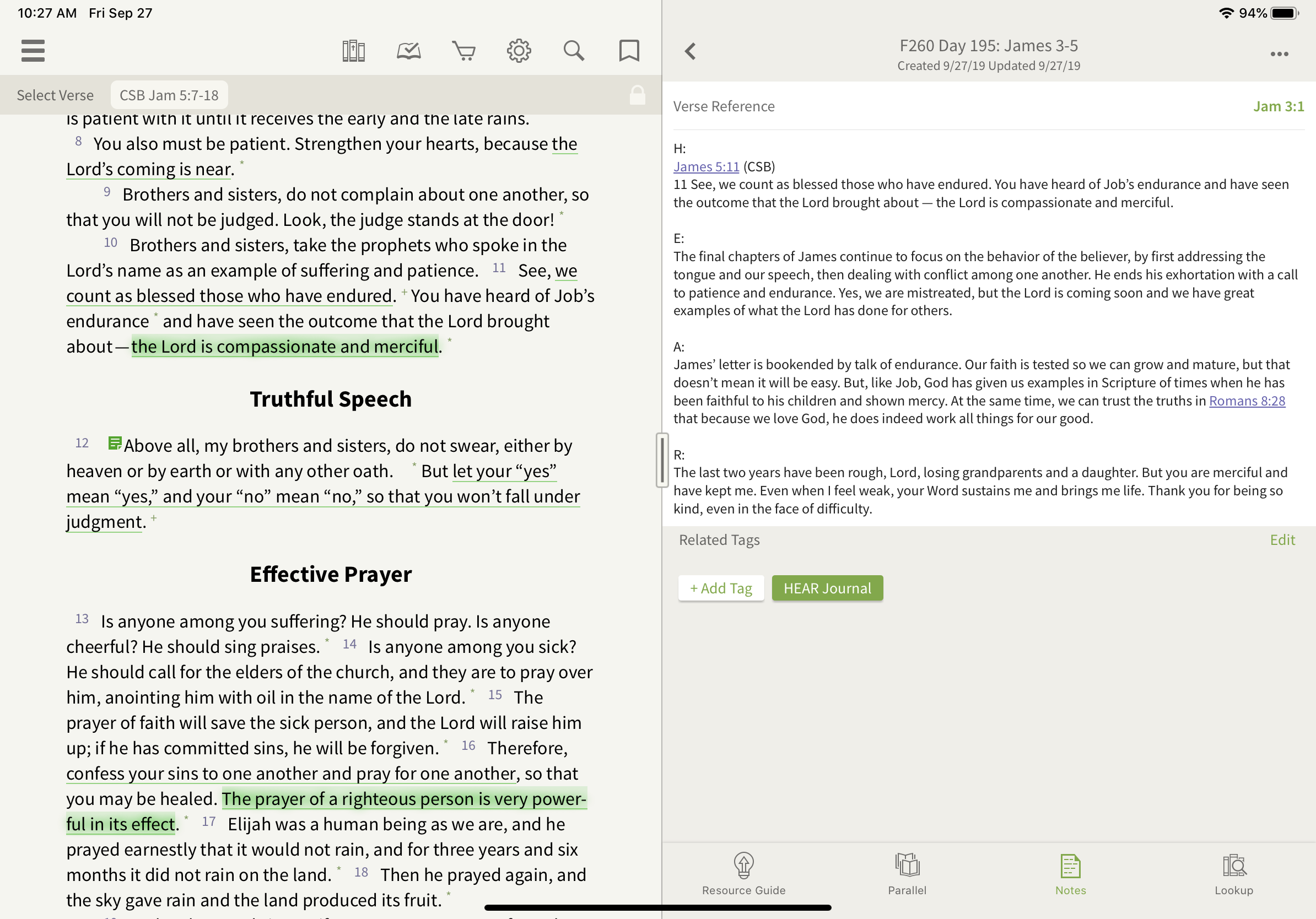Ready to join us in a study of James 5 with the HEAR journaling Bible study method? We’ll learn this new method and also about finding the strength to endure hardship. If you haven’t read our others Bible study posts on James, check them out here.
Right now one of my favorite Bible study resources is the CSB Disciple’s Study Bible. I have three copies of it sitting on my bookshelf right now, I love it that much. This year I’ve been using one of those copies to read through the Bible using the Foundations 260 Bible reading plan. I take notes in the margins and I highlight and underline key phrases and passages as I read. But, one of the most important things I do as I read is take time to journal about the day’s passage. This takes my time from checking off boxes to hearing from the Lord and actively engaging with the text. At the end of the year, when my reading plan is finished, I will give this marked up Bible to my eldest son as a snapshot of my time in the Word.
Why did I tell you all this? Because this morning my reading just happened to cover James 5, the passage we want to take a look at today. Plus, I’ve been meticulously copying all my handwritten notes and highlights from the physical Bible into the Olive Tree Bible app. And one of the things about the CSB Disciple’s Study Bible in the Bible app is that it includes everything you’d find in the physical Bible, including the reading plan I’m using. So I want to share with you how I spend time in the Word each morning using today’s journal entry.

The HEAR Bible Journaling Method
The Bible journaling method prescribed in the Disciple’s Study Bible is called HEAR journaling. It was developed by pastor Robby Gallaty, founder of Replicate Ministries, as a byproduct of his time discipling men. He wanted an easy way for the guys he was discipling to study the Bible and remember what they had read. The method is similar to other methods you may be familiar with, such as the SOAP method.
HEAR stands for Highlight, Explain, Apply, and Respond.
Highlight
In a notebook (or the Olive Tree Bible App) you create a note, date it and put the passage you’re studying. After you’ve read the passage you then highlight a verse or two that stands out to you. Write down the verse reference and its associated text.
Explain
Next, you simply explain the text. To whom was this written? Why? How does this passage fit with what comes before and after it? What is the Holy Spirit communicating through this text? In essence, you are writing a short summary of what the text is about and what it means.
Apply
The third step in the journaling process is applying the text to your own life. What does the text mean today? What is God saying to you personally through this passage? How can you apply what you’ve read? Write out a couple sentences detailing what the Lord is speaking to you through the text.
Respond
Finally, the last step is responding to the text. This can either be a short prayer or an action that you can take that day after reading the text. Is there a command to follow in the text? How are you different because of what you’ve learned?
The beautiful thing about this journaling method is that it is short and only takes a few minutes, and it can be done every time you read or study a passage.
So, let’s apply this to my reading in James 3-5 today (day 195 of the F-260 plan).
HEAR Journaling in the Olive Tree Bible App
Step 1: Engage the Text
The first thing I do when I come to the text is pray. I ask the Lord to open my heart and clear my mind from distraction. I want to see what he wants to reveal in his Word. From there, I open up my Bible to the text for the day, in this case James 3-5, and read. As I read, I underline and highlight important phrases and verses in the text, or at least ones that stand out to me. I also take notes as I read. Application thoughts come to me that I do not want to forget, so I jot them down.
As you see in the screenshots, I made quite a few highlights in James 5 and in the study notes.

I also made a quick note on James 5:12. My note summarizes the verse, and says: Don’t make promises you can’t or don’t intend to keep. I want my son to remember this when he receives this Bible.

Step 2: Read the Devotional
Next, I read the short summary devotional included in the study notes for the passage. The text for today’s passage is:
One of the continual themes throughout James’s letter is right Christian behavior. As people transformed by Jesus, Christians are to live and act differently from the rest of the world. Paul specifically connected this to speech. James emphasized the power of our words—either for good or for bad—and the need for consistency in believers’ speech. James also reminded his readers that Christians must rely on the wisdom of God to control their behavior. In addition to speech, James warned against the danger of unaddressed conflict. Evidently, judging others was a significant problem in the early church, which fueled conflicts. James stressed the availability of God’s grace to correct believers’ conflicts with one another. On the basis of that grace, he called on them to submit and draw near to God through repentance and humility. After some additional teachings, James closed his letter by calling for believers to be patient through suffering as they await Jesus’s return and to endure on the basis of God’s nature. In the meantime, we are to maintain our faith in God and utilize the power of prayer he has given us.
CSB Disciple’s Study Bible
Step 3: Journal
Once all my reading and highlighting is finished, I begin my journal entry. I tap on the first verse in the passage (in this case James 3:1) and make a new note. I title it with the day’s reading “F260 Day 195: James 3-5.” Then I begin my HEAR journal entry for the day. [Pro Tip: create your note by tapping on the verse, then close and open it in the split window for easier note taking.]
In my journal, the first thing I do is select and copy the verse for my highlighted text. Today, James 5:11 stood out to me. The past couple years have been pretty rough personally, with lots of death in my family, including the loss of a newborn daughter. So the call to endure spoke to my spirit this morning.
Next, I explain the text, summarizing the three chapters I read. Then I move on to application and respond by saying a quick prayer of thanksgiving to God.

Finally, if you want to get fancy, you can tag, categorize, and give your note an icon. For all my HEAR Journals I’ve created a tag called “HEAR Journal.” And for this year’s F260 reading, all those entries are stored in a category called “F260 2019” so I can easily find them later. And, to stick with the color scheme of this study Bible, I use the green notebook icon (also hence all the green highlights & notes).
My HEAR Journaling for James 3-5
Here’s my full journal entry (including any typos & poor grammar):
H:
James 5:11 (CSB)
11 See, we count as blessed those who have endured. You have heard of Job’s endurance and have seen the outcome that the Lord brought about — the Lord is compassionate and merciful.E:
The final chapters of James continue to focus on the behavior of the believer, by first addressing the tongue and our speech, then dealing with conflict among one another. He ends his exhortation with a call to patience and endurance. Yes, we are mistreated, but the Lord is coming soon and we have great examples of what the Lord has done for others.A:
James’ letter is bookended by talk of endurance. Our faith is tested so we can grow and mature, but that doesn’t mean it will be easy. But, like Job, God has given us examples in Scripture of times when he has been faithful to his children and shown mercy. At the same time, we can trust the truths in Romans 8:28 that because we love God, he does indeed work all things for our good.R:
The last two years have been rough, Lord, losing grandparents and a daughter. But you are merciful and have kept me. Even when I feel weak, your Word sustains me and brings me life. Thank you for being so kind, even in the face of difficulty.
Make the Most of Your Time in the Word
We don’t always have a lot of time in our day to dive deep into Bible study, but we always have time to read something in the Word. That is why I love the HEAR journaling method and all that’s included in the CSB Disciple’s Study Bible. It keeps me focused on HEARing from God every time I open up my Bible.
Plus, there’s a wealth of additional resources that will help you make disciples who make disciples. Because of everything this study Bible offers, it has become my go to resource whenever I spend time in the Word. I hope you add it to your library too and make journaling a regular practice in your studies.
Also, you can find the Foundations 260 & Foundations New Testament reading plans in our app by searching for “F260” or “Foundations.” These plans contain just the Bible readings, without the devotional content.
Other Posts on James
James: A Brief Character Study
A Word Study Example in James 2
Finding Godly Wisdom in James 3
Writing Your Own Bible Outlines: James 4




0 Comments